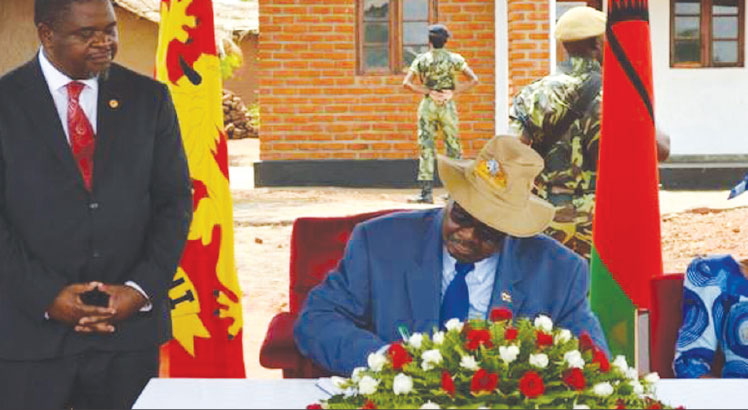Politicisation of public loans comes under fire
National Alliance Against Corruption and Youth and Society (YAS) have dared government to stop politicising public loan facilities because the tendency is costing taxpayers heavily amid little or no positive impact from the initiatives.
The sentiments come on the back of an admission by the Ministry of Lands that government is struggling to recover money under the Decent and Affordable Housing Subsidy Programme (DAHSP), widely known as Cement and Malata Subsidy, with barely K200 million recovered to date from K12.6 billion worth of loans disbursed since 2014.
In an interview yesterday, YAS executive director Charles Kajoloweka said the high default rate associated with such loan facilities is due to the politicisation of the initiatives.
He said: “There is heavy politics around the introduction and implementation of the programmes. Usually, such loans are given out towards elections for political mileage, with most beneficiaries being those affiliated to the ruling parties.

“People who get such loans feel it is compensation for the support they give to the political parties so they do not see the reason to pay back.”
Kajoloweka has since asked Parliament to ensure that the resources are accounted for.
He said: “Parliament is key when it comes to accountability. Maybe the challenge is Parliament is also an institution for politicians and it becomes a challenge to check such programmes that support their popularity.
“We also need to look at long-term programmes and not those attached to elections.”
In a separate interview, National Alliance Against Corruption chairperson Moses Mkandawire also mentioned politicisation of public loan programmes as a contributing factor to the abuse of funds.
He said: “They are ideally good programmes because these are resources that could have multiplied and benefited many. But now, it is political party supporters who get the loans. They feel it is time to enjoy.
“Had it been that everyone is treated as a citizen and everyone acts as a responsible citizen, these loans would be paid back so that others benefit.”
Mkandawire also called for serious enforcement of recovery of the money so that more people also benefit from the facilities.
Since 2014, government disbursed a total K12.6 billion under DAHSP, out of which government projected to recover K6.3 billion by 2024.
During a meeting with the Public Accounts Committee of Parliament at Parliament Building in Lilongwe on Thursday, Ministry of Lands Principal Secretary (PS) Davie Chilonga said so far K200 million has been recovered.
The PS admitted that the ministry should have recovered about K3 billion by now.
In an interview after the meeting, he said recovering the loans is a challenge as the people who benefited are poor, but the ministry is working to recover the funds.
Said Chilonga: “We have come up with a strategy to ensure that they pay and we will continue collecting. So, to those who built houses under DAHSP, the communication from the ministry is please be paying your loans as is required in the agreement.”
Committee chairperson Mark Botomani called on government to find ways of resolving the challenge, saying resources are being lost in efforts to recover the loans that may not even be recovered.
“They are increasing the burden on government. The money may already be lost, but they are now spending more money in order for them to recover the loans,” he said.
Introduced during the administration of former president Peter Mutharika in 2014, the subsidy had a component of loans and grants.
Initially, the plan was to be constructing 15 440 houses per year in the country’s 193 constituencies. Each constituency was to benefit 80 houses, 75 under the loan facility and five under grants.
However, due to funding challenges that was not being followed and the grant houses were not constructed.
In the loans component, 37 781 people benefited, but only 22 420 structures were earlier reported to have been completed. The other structures were not completed due to lack of funding.
The National Economic Empowerment Fund also earlier indicated it had challenges in recovering loans which in turn was affecting its capacity to disburse loans to new applicants.





